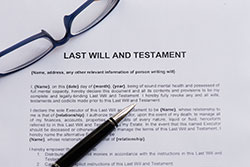|
Irvine, CA Estate Planning Blog
Monday, October 26, 2015

A life estate is a special designation in probate law referring to a gift to a family member that lasts as long as the life of the recipient. If an individual uses a life estate as part of his or her estate plan, whatever is bequeathed under the life estate will revert back to the residual estate upon the death of the life estate recipient. It is most common in scenarios where an individual starts a new family without children later in life and wants to ensure that the present spouse is taken care of for the remainder of her or his life. The owner of a life estate is called a life tenant. A life estate is often used as an alternative to a trust because it provides the life tenant with more control over the transferred asset.
A life tenant may treat an asset as his or her own. A home may be rented to tenants for income. The life tenant may sell his or her interest in the property to the heirs of the residual estate or to third parties. If the property is sold to a third party, that third party must surrender the property to the residual heirs upon the death of the life tenant.
Though the property belongs to the life tenant, the life tenant has a duty to the residual heirs to keep the property reasonably maintained and in good condition. He or she has an obligation to avoid mortgage arrearages and tax liens while in possession of the property. Exploiting natural resources on the property may be restricted during a life tenancy. A life tenant may not bequeath his or her interest in a life estate through a will because that interest immediately terminates upon the life tenant’s death. Significant changes to the property need to be agreed upon by all parties.
Though there are benefits, there are also drawbacks to establishing a life estate as part of an estate plan. The action could create estate tax issues for the tenant’s estate. In addition, creditors of the tenant may attach liens on the property, creating complicated legal issues for the heirs of the residual estate.
Monday, October 19, 2015

There are many reasons why a person might leave a spouse or another loved one out of his or her will. It is possible that the will in question was executed prior to a marriage and was never properly updated. It may also be the case that the husband and wife, though still technically married, are estranged, and do not contribute to one another’s support. An end of life revelation of a past infidelity may anger a spouse enough to rewrite his or her last will and testament. Individuals may make rash decisions to disinherit spouses based on a single argument or misunderstanding. This can be exacerbated by symptoms of dementia. Regardless of the reason, a person who is not named in his or her spouse’s will may petition the court for the spousal share to receive a portion of the estate.
The spousal share of an estate, also called an elective share, is a holdover from the concept of dower in English common law. Traditionally, dower is a portion of a man’s estate guaranteed to a wife when she is widowed to ensure that she does not fall into poverty after her husband dies. The practice continues today without the same restrictions on gender. Every state in America has a provision in its laws to protect an individual whose spouse dies from being left with nothing. Similar provisions for children also exist in some states. Attempts have been made to introduce legislation to protect unmarried romantic partners the same way as married couples, but these attempts have had little success.
The structure of these protections vary from state to state. The value of the estate for the purposes of establishing the spousal share may include the widow’s assets depending on the jurisdiction. Some states provide a widowed spouse a larger share of the deceased’s estate than others, but almost every state prohibits an individual from disinheriting a spouse entirely. The one state that does not permit an elective share to the spouse in a probate case requires that an estate pay a disinherited spouse financial support for up to one year after the death.
Monday, October 5, 2015

There are several reasons that a will may prove invalid. It is important for testators to be aware of these pitfalls in order to avoid them.
Improper Execution
The requirements vary from state to state, but most states require a valid will to be witnessed by two people not named in the will. Some jurisdictions require the document to be notarized as well. Although these restrictions may be relaxed if the will is holographic (handwritten), it is best to satisfy these requirements to ensure that the testamentary document will be honored by the probate court.
Lack of Testamentary Capacity
Anyone over the age of 18 is presumed to understand what a will is. At the end of life, individuals are often not in the best state of mind. If court finds that an individual is suffering from dementia, is under the influence of drugs or alcohol, or is incapable of understanding the document being executed for some other reason, the court may invalidate the will on the grounds that the individual does not have testamentary capacity.
Replacement by a Later Will
Whenever an individual writes a new will, it invalidates all wills made previously. This means that a will might be believed to be valid for months until a more recently executed document surfaces. The newest will always takes precedence, controlling how assets should be distributed.
Lack of Required Content
Every will is required to contain certain provisions to carry out its purpose. These provisions, ensure that the testator understands the reason for executing the document. Although these provisions vary from state to state, some are common to all jurisdictions. It should be clear that the document is intended to be a will. The document should demonstrate an individual’s wishes in regard to what should happen to his or her property after death. A proper will should also include a provision to appoint an executor to act as an agent for the estate and enforce the terms of the will. If the document lacks any of these provisions, the will may be declared invalid.
Undue influence or fraud
A will that was executed under undue influence, coercion or fraud will be invalidated by a court. If a will has been presented to a testator for a signature as if it were any other document, like a power of attorney or a business contract, the court will find that the will was fraudulently obtained and will not honor it. If an individual providing end of life care with exclusive access to the testator threatens to stop care unless a will is modified, that modification is considered to be the result of undue influence and the court will not accept it.
Thursday, October 1, 2015
Many Americans have the misperception that estate planning is simply preparing for one’s death and is only necessary for the affluent. To the contrary, estate planning is as much about passing values to loved ones as it is about passing material possessions. Thus it should come as no surprise that a recent Forbes article describes estate planning as “the most important love letters you’ll ever write,” encouraging readers to “find inspiration in knowing that you’re caring for the people and causes you love, even if you’re not here anymore.” The Forbes article correctly concludes that estate planning is for every American (other than minors), and that everyone should successfully complete “thoughtfully prepared estate planning documents.” The complexity of those documents may change for more affluent Americans, but the need to care for loved ones and causes exists for everyone. And working with a qualified estate planner helps enlighten people as to all they can accomplish through the estate planning process.
Monday, September 28, 2015

Estate planning is designed to fulfill the wishes of a person after his or her death. Problems can easily arise, however, if the estate plan contains unanswered questions that can no longer be resolved after the person's demise. This can, and frequently does, lead to costly litigation counter-productive to the goals of the estate. It is important that will be written in language that is clear and that the document has been well proofread because something as simple as a misplaced comma can significantly alter its meaning.
Planning for every possible contingency is a significant part of estate planning. Tragic scenarios in which an estate planner’s loved ones predecease him or her, though uncomfortable, must be considered during the preparation of a will to avoid otherwise unforeseen conflicts.
Even trained professionals can make significant mistakes if they are not well versed in estate planning. An attorney who practices general law, while perfectly capable of preparing simple wills, may not understand the intricacies of trusts and guardianships. A great many attorneys, not aware of the tax consequences of bequests involving IRAs, may leave heirs with unnecessary financial obligations. If an attorney is not knowledgeable enough to ask the proper questions, he or she will be unable to prepare an estate plan that functions efficiently and ensures the proper distribution of the estate's assets.
In spite of the wealth of an individual, the estate may be cash deficient if that wealth is tied up in assets at the time of the individual's death. Problems can also result if an estate planner has distributed assets into joint bank accounts or accounts with pay on death provisions. If the executor of the estate does not have access to funds to pay the estate's bills or taxes, the heirs of the estate may run into trouble.
Even if estate planning is handled well from a logistical point of view, lack of communication with loved ones can interfere with a will's desired execution. A tragedy that incapacitates the testator can occur suddenly, so it is imperative that a savvy estate planner confers with loved ones as soon as possible, making them aware of any future obligations, such as life insurance premiums that must be paid and informing them of the location of any probate documents and inventories of assets. Such conversations ensure that the individual's wishes will be carried out without complications or delay in the event of an unexpected incapacity.
In addition to communicating logistical information, it is also essential to schedule a personal conversation with loved ones that makes clear any sentimental bequests or large gifts that require explanation. This avoids the shock or discomfort that may arise after one's death during which a well-thought-out decision is questioned as impulsive or irrational. Such direct communication of one's plans avoids unnecessary envy, arguments or rivalry among family and friends.
Consulting with attorneys who specialize in estate planning is the cornerstone of creating a plan to ensure that one's desires are carried out and that all the bases are covered. Estate planning attorneys serve as invaluable repositories of all information necessary to strategizing a plan that not only meets one's personal needs and desires, but is legally binding.
Monday, September 14, 2015

Will - a written document specifying a person’s wishes concerning his or her property distribution upon his or her death.
In order to be enforced by a court of law, a will must be signed in accordance with the applicable wills act.
Testator/Testatrix - the person who signs the will.
Heirs - beneficiaries of an estate.
Executor/Executrix - the individual given authority by the testator to make decisions to put the testator’s written directions into effect.
Once the will is entered into probate, the executor’s signature is equivalent to the testator’s. The executor has a legal duty to the heirs of the estate to act in the best interest of the estate, and may collect a fee for performing such service.
Administrator/Administratrix - the person who assumes the role of the executor when a person dies without a will (intestate).
The Administrator must apply with the local probate office and may be required to provide a bond to be held in escrow as collateral for control over the assets of the estate.
Codicil - an amendment to a will.
In order to be valid, a codicil must comply with all the requirements of the applicable wills act.
Holographic Will- a handwritten will.
Holographic wills are often exempt from requirements of the applicable wills act.
Bequest - a gift given by the testator to his or her heirs through a will.
Residual Estate - the balance of a testator’s belongings after debts have been paid and specific bequests have been distributed.
Intestate - not having signed a will before one dies; a person who dies without having signed a will.
Life Estate - a bequest that gives an heir the right to have exclusive use of a property for the remainder of his or her life, but without the power to transfer such property upon the death of that heir.
The property will transfer to the heirs of the residual estate after the death of the beneficiary of the life estate.
Per stirpes - a Latin phrase precisely translated as “by the branch” meaning that, if an heir named in the will dies before the testator, that heir’s share will be divided equally among that beneficiary’s own heirs.
An alternative to per capita, described below.
Per capita - a Latin phrase precisely translated as “by the head” meaning that, if an heir named in the will dies before the testator, that heir’s share will be divided among the testator’s remaining heirs.
An alternative to per stirpes, described above.
While it is a good idea to have a basic understanding of fundamental estate planning vocabulary, this cannot serve as a substitute for the services of an experienced attorney.
Monday, September 7, 2015
 How can I control my assets after death? How can I control my assets after death?
The practice of estate planning is dedicated to preserving an individual’s control over his or her assets after death. A simple will can control which individuals receive what assets, but a more thorough plan has the potential to do much more. Establishing a trust is the most common method used to exercise this kind of control.
A trust can issue a bequest restricted by a condition; for example, a trust might be established to pay out $10,000.00 to a specific grandchild only once he or she has reached 18 years of age. Multiple payments can be made to the beneficiaries as long as the trust is funded. The trust can stipulate that the grandchild may have to graduate from college to receive the money, or even that he or she must graduate from a specific school with a minimum grade-point average or membership in a particular fraternity or sorority.
A trust can make the condition of payment as specific or as broad as the creator of the trust wishes. It may, for instance, bequeath benefits to a humanitarian organization on condition that the organization continues to provide food and shelter to the homeless. There is no limit to the number of conditions permissible in a trust document. Even when the conditions go against public policy and general norms and mores established by society, as long as the conditions may be met legally, they will be upheld by the court.
In order to create a trust, there must be a capital investment to fund it and a trustee must be named. The trustee is responsible for protecting the assets of the trust, investing them to the best of his or her ability, managing real estate and other long-term assets, interpreting the trust document, communicating regularly with the beneficiaries of the trust and performing all of these actions with a high level of integrity. Trust assets may be used to pay for expenses of managing the trust as well as to provide a stipend for the trustee if so provided for in the trust document.
If a trust document is not well written, it may be the target of a lawsuit seeking to dissolve the trust and disburse the assets held therein. Even if the trust is defended successfully, the costs of this challenge may deplete its coffers and frustrate the very reason for its creation. In order to avoid these possible pitfalls, it is imperative that a trust document be drafted by an attorney with a high degree of experience in estate planning law.
Tuesday, September 1, 2015
With higher education costs outpacing inflation by 5-6% per year, and the average cost of a four-year public school at nearly $20,000 per year (double that for private schools) it’s no surprise that many parents and grandparents are deeply concerned about how they will pay for higher education. Many of these clients are similarly concerned about estate planning. One tool that can accomplish both is a college savings plan commonly known as a 529 plan (named after the Internal Revenue Code section that creates them). Contributions to 529 plans are generally not subject to gift, estate or GST tax, gains are not subject to income tax if used for qualified higher education expenses (QHEEs), and these assets are not owned by the student for financial aid purposes, making them an excellent tool for saving for college. Furthermore, you can “front-load” a 529 plan by contributing five years’ worth of gift tax annual exclusions (currently $14,000 per year, or $70,000 per person) free of gift and estate tax as long as the contributor lives at least five years. Thus, a married couple can contribute up to $140,000 per child or grandchild! The downsides to 529 plans are gains are subject to tax if not used for QHEEs and there are generally limited investment options, similar to mutual funds. There are also high fees with some state’s 529 plans, so it’s worth some research. An excellent resource in this area is the website savingforcollege.com. One key consideration is the particular 529 plan’s impact on state income tax: is the client eligible for a state income tax deduction for investing in his or her state’s 529 plan?
Wednesday, August 26, 2015

A Pooled Income Trust is a special kind of trust that is established by a non-profit organization. This trust allows individuals of any age (typically over 65) to become financially eligible for public assistance benefits (such as Medi-Cal home care and Supplemental Security Income), while preserving their monthly income in trust for living expenses and supplemental needs. All income received by the beneficiary must be deposited into the Pooled Income Trust.
In order to be eligible to deposit your income into a Pooled Income Trust, you must be disabled as defined by law. For purposes of the Trust, "disabled" typically includes age-related infirmities. The Trust may only be established by a parent, a grandparent, a legal guardian, the individual beneficiary (you), or by a court order.
Typical individuals who use a Pool Income Trust are: (1) elderly persons living at home who would like to protect their income while accessing Medi-Cal home care; (2) recipients of public benefit programs such as Supplemental Security Income (SSI) and Medi-Cal; (3) persons living in an Assisted Living Community under a Medi-Cal program who would like to protect their income while receiving Medi-Cal coverage.
Medi-Cal recipients who deposit their income into a Pooled Income Trust will not be subject to the rules that normally apply to "excess income," meaning that the Trust income will not be considered as available income to be spent down each month. Supplemental payments for the benefit of the Medi-Cal recipient include: living expenses, including food and clothing; homeowner expenses including real estate taxes, utilities and insurance, rental expenses, supplemental home care services, geriatric care services, entertainment and travel expenses, medical procedures not provided through government assistance, attorney and guardian fees, and any other expense not provided by government assistance programs.
Wednesday, August 12, 2015
7643.jpg)
You spend your whole life building your legacy but sadly, that is not always enough. Without careful estate tax planning, much of it could be lost to taxes or misdirected. While a will or living trust is essential for dividing your estate as you wish, an estate tax plan ensures you pass on as much of your legacy as possible.
Understanding estate tax laws
For the past decade, estate tax laws have been a sort of political football with significant changes occurring every few years. The good news is that the 2013 tax act made the basic $5 million estate tax exemption “permanent,” but at a higher rate of 40%, though the law continues to adjust the exemption level for inflation. With this adjustment the 2015 exclusion $5.43 million ($10.86 million per married couple). The law also retained exclusion “portability” which means that if one spouse dies in 2014 or 2015, the surviving spouse may pass on the unused portion of the deceased spouse’s exclusion. This portability is not automatic, however. The unused portion needs to be transferred by the executor to the surviving spouse, and a special tax return must be filed within nine months. The surviving spouse does not have to pay estate taxes at this time, they only become due after both spouses have died.
Optimizing your estate plan
One way to maximize the amount you can pass on is through annual gifting while you are alive. An individual is allowed to give $14,000 each year to another individual, tax-free. If you give more than that, it will reduce your basic lifetime exclusion. So, if you give a child $50,000 this year, your basic $5.43 million exclusion will be reduced by $36,000 at the time of your death. You can gift as much as your full $5.43 million exclusion before incurring taxes, although doing so would “exhaust” your estate tax exemption at death. Gift taxes are paid by the giver, not the recipient.
An experienced estate tax planning attorney can help minimize potential gift and estate taxes by:
- Identifying taxable assets
- Transforming your wishes into a will or living trust
- Keeping you apprised of federal and state tax law changes
- Establishing an annual gifting plan
- Creating family and charitable trusts
- Setting up IRA charitable rollovers
- Setting up 529 education savings plans
- Helping you create a succession plan for your family business
It’s never pleasant to consider the end of your life, but planning for it will help ensure that the things you care about are cared for. It is one of the greatest gifts you can give your loved ones.
Thursday, August 6, 2015

There are a lot of myths and misconceptions surrounding estate planning. Many people think that a last will and testament is the only estate planning document you really need. This of course is false. Others assume that you only need to have an estate plan in place if you’re a millionaire. This too is false. Another popular myth in the world of estate planning is that the best way to disinherit a relative (particularly a child) is to leave him or her a single dollar in your will. You probably guessed it- this too is entirely false.
The truth of the matter is that you must be very careful with leaving someone you really want to disinherit a token gift of $1 or some other small amount. By doing so, you have now made that person a beneficiary of your estate. It is possible, if not likely, that state law will require your executor to provide all beneficiaries with copies of all pleadings, an accounting, and notice of various administration activities. This may make it easier for this "beneficiary" to now complain about things and may cause problems for your executor which could cost your estate money.
Instead of leaving a token amount, you might consider mentioning the person by name so it is clear that you have not simply overlooked them. Then, you would specifically state you are intentionally disinheriting them from your estate. Also, consider if you wish to disinherit that person's children or more remote descendants and if so specifically state that as well in your will. You should consult with an estate planning lawyer to assist you in the proper wording as you will want to make sure there is as little likelihood of a will contest as possible.
Law Offices Of Michael J. Wittick, A Professional Law Corporation is located in Irvine, CA and serves clients with estate and wealth preservation matters throughout Irvine, Lake Forest, Laguna Woods, Laguna Hills, Foothill Ranch, Tustin, Aliso Viejo and the surrounding areas.

|

|
|
|